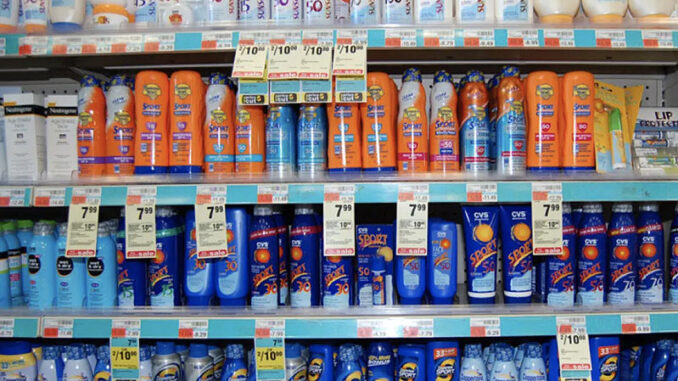
Report by Paula Antolini, May 23, 2012, 10:13PM EDT
Numerous mind-boggling choices! How do you choose? We are all faced with shelves and shelves of sunscreen products in the store. Or should you sit in the sun at all?
We all want to keep ourselves healthy and do what’s best regarding our skin in summer months, and all year round, for that matter. As soon as warmer weather arrives and summer is on the horizon, most of us head over to our local store and purchase sunscreen.
There are many names for it.
Sunscreen, sunblock, sun tan lotion, sun cream or gel, the list goes on, but they are all meant to protect our skin from the damaging effects of the sun and protect us from harm to various degrees.
There are lots of catchy phrases for sunscreen names too.
I wonder what magic the sunscreen products hold with the name “age defense”, “anti-aging,” “age-shield,” or “age reversal mineral” (or if there is a “weight reduction” sunscreen to go with these age-reduction ones). There is one I found called “liftactive CxP UV bio-lifting anti-wrinkle & firming broad spectrum sunscreen” and another one described as “pro mat ultra mattifying.” Does anyone know what all of this means or are we supposed to wing it?
We soon realize we are faced with shelves and shelves of sunscreen products, numerous mind-boggling choices! How do you choose?
The decision is not that easy.
Do you instantly grab the brand you most remember growing up with, that your Mom slathered all over you at the beach when you were younger? Or are you the independent and/or intellectual type, preferring to make your own choice, and you stand there comparing labels and weighing the pros and cons of sun protection in minute detail? Or do you simply use the brand your friends use? Do you choose the product by scent or “flavor” alone? Or choose one that has pretty package? How about one that has an included free discount coupon? Is SPF (sun protection factor) most important to you?
There is something called “tanning behavior” too.
This is how your particular skin type reacts to the sun. There are charts for that, for us to peruse, as if all the other decisions are not enough already.
How about price? Is that your deciding factor?
Where do you draw the line there? How do you know if the less expensive products are not equally effective? Do we have to be chemists to simply purchase sunscreen?
Let’s also not forget the sunscreen products made especially for children.
We must always protect children’s more sensitive skin and monitor their time in the sun.
Here are more choices you face:
Lots of oil in these sun protection products too, but again, very confusing. What’s the difference between “dry oil,” “dark tanning oil,” “sunblock lotion oil,” and “tropical oil”? You tell me. Then there’s “oil free,” so does this mean the oil is not really necessary?
If all that sun makes you dry, try “silk hydration with hydrating ribbons,” whatever that is.
Do personalities come into play with sunscreen? I guess if you are a “touchy” person you will choose “sheer dry-touch,” “sheer touch,” “ultra light,” “sheer mist,” or “ultra dry sheer.” If you are a “sensitive” person, choose “sensitive skin,” “hypoallergenic,” “Australian sensitive,” or perhaps this one “clear face break-out free liquid-lotion sunblock.” If you are “defensive” person, you’d choose “shield,” “water resistant,” or even “continuous protection.”
Got all that?
Some sunscreens make me hungry or thirsty, such as “melt-in sunscreen milk,” “deep tanning with green tea,” “cocoa butter,” or a brand called “Banana Boat.” There’s even a lip protector called “vanilla mint.” Yum.
You can also pretty much assume sunscreens come in all sorts of scents too. One example is “lightly scented lavender” and you can get “unscented” too.
No surprise, lots of sports-related sunscreen references, you just need to choose your level from “extreme sport,” “performance coolzone,” “performance advanced,” “performance active,” “sport clear continuous,” “broad spectrum sport,” “sport sunscreen lotion,” or “sport performance active dry protection”. Simple choice, right?
Health enthusiasts can choose “organics all natural.”
Do-it-yourselfers would choose “self-tanning.”
Piece of cake.
If you are concerned about speed or time frame, perhaps you should use sunscreens with these names “fast cover”, “instant bronzer” or “long-lasting.” Maybe strength is your priority, then use “advanced protection,” “ultra defense,” or “ultrablok sunblock” (that is the correct spelling).
If you want to use a spray method, choose one of these “continuous spray,” “clear spray,” “continuous clear spray,” or “clear mist”. Those are clear differences, right?
You can also purchase products with additional products or features added, such as “with zinc oxide,””with transparent zinc oxide,” “with collagen” or “with UVA.” So which will it be? Do you know?
By now your feet are probably starting to hurt as you stand there trying to make a selection of which sunscreen to purchase.
I am worried about the numerous choices in the foot care products isle too. I saw another product on my way to view sunscreen products, NOT sunscreen, but a great product by the name of “North American Hemp Company Hemp Hangnail Helper Hand & Nail Cream.” I just had to mention that one.
I suppose products that are labeled “full-spectrum” are for people who want it all. Perhaps these are names from manufacturers who want to sell to all different consumer types using their SINGLE product concoction too (of course). Can you tell the difference between “fast cover continuous lotion spray sport sunscreen” and “continuous clear spray sport sunscreen” and “fast cover continuous clear spray sunscreen? How many times did you just read that? Can you choose one quickly? This one is a little easier to understand but can it really do all that: “wet skin swim + humidity + sweat sunblock spray.”
There is a selection of specialty sun products for various needs.
Products such as a “UV exposure monitoring wristband” change color to reflect your exposure to the sun. It’s supposed to alert you to when you need to reapply sunscreen or get out of the sun, but what if you fall asleep suntanning? Does it come with an alarm clock? It should!
Another specialty product is “color guard tattoo protection.” This says it is made to “preserve and protect rich colors.” I was unaware tattoos needed sunscreen too but I guess they do.
If tattoos are not your visual aim, then you can add sunscreen described as having a “shimmer effect.” I wonder how that looks?
Interestingly a product advertised to not hurt your eyes if applying it close to them, is called “tear free” for children but the adult version is called “anti-sting.”
Do we need to regulate sunscreen names in order to not be perplexed?
You can get sunscreen specifically for every body part too.
Products named “advanced sunscreen for face”, “lip healthy daily hydration”, “ultimate sheer daily for the face” and “sunstick for ears, nose and face” are samples of this. There’s also “headshade” for bald heads. Does this mean that soon they might have “earlobe protection,” or “foot bottom sunblock” too?
Are children’s sunscreen products easier to understand? They have names like “pure and simple”, “baby lotion”, “water babies”, “baby stick” and “kids max protect & play” (along with “tear free” already mentioned above). You really have to read the entire label to tell the difference though. Do you have time for that?
Sometimes I feel like they are talking about car maintenance. Check out “complete moisture lip protectant” or “sunscreen fluid.”
Why do they call it a “tanning lotion” but then say it is a “sunscreen”?
Does it tan (absorb) the sun or screen the sun? I am lost now.
Or should you sit in the sun at all?
Moderate exposure to the sun does have some beneficial effects (for example, the body produces Vitamin D) but too much sun exposure has negative effects (such as sunburn or even potentially skin cancer).
So now you consider artificial tanning methods.
Do you think that will simplify your choices? Not really. There are tanning beds in professional salons, or “spray on” chemicals professionally applied in salon tanning booths, and more methods too, if you want an instant tan.
You can use numerous artificial tanning products yourself too.
This “sunless tanning” can be achieved by applying various “self-tanner” gels, lotions, creams or sprays, to get that darker look desired, or bronzers are another way to go. These are actually dyes that stain the skin and look like a tan but can wash off.
There are even “tan accelerators.” These are products you apply to speed up the tanning process.
You can also simply use darker make-up to get a tan effect too.
Some dark make-up even has sun BLOCK in it, kind of ironic, a product that makes you look tan also keeps you from looking tan, or getting a real tan! Are we confused enough here?
How about tan-through swimwear! Will that be your choice?
This is a type of swimsuit with thousands of tiny holes in the fabric, that let sunlight pass through so you can get a tan, but the fabric holes are small enough so the eye does not see through the fabric. Are you brave enough to try it?
You can also purchase “sun protective clothing” which has fabrics that contain “UV absorbing chemicals to enhance the UV protection.”
These come in all types of items from head to toe, starting with sun hats and going on to shirts, shorts and so on, all containing sun protection chemicals. So not only do we need to apply sunscreen to our skin but manufacturers have already applied it to our clothes.
Let’s not forget sunscreen with insect repellent in it too.
A whole topic itself because of the health issues of having some particular chemicals in contact with your skin repeatedly, such as deet.
Of course there is much controversy of whether to get a tan at all.
It’s a personal decision, and also one that pertains to health issues too. Perhaps your choice “to tan or not to tan” also reflects fashion trends or social issues too. Before the 1920’s women did not want a tan because it “represented those who worked a lot outdoors.” Now a dark tan seems to represent luxury and leisure time of the wealthy, and if not overdone, a healthy look too.
Decisions about tanning change with the times but just HOW do we digest all of the information and come up with the correct decision for ourselves?
No easy answer.
All of the above descriptions are real product names taken directly off package labels.
It’s fun to see how creative sunscreen companies can be and we had some fun with the names, but skin care regarding the sun is an important and serious issue so please choose wisely.
So how will you get your tan?
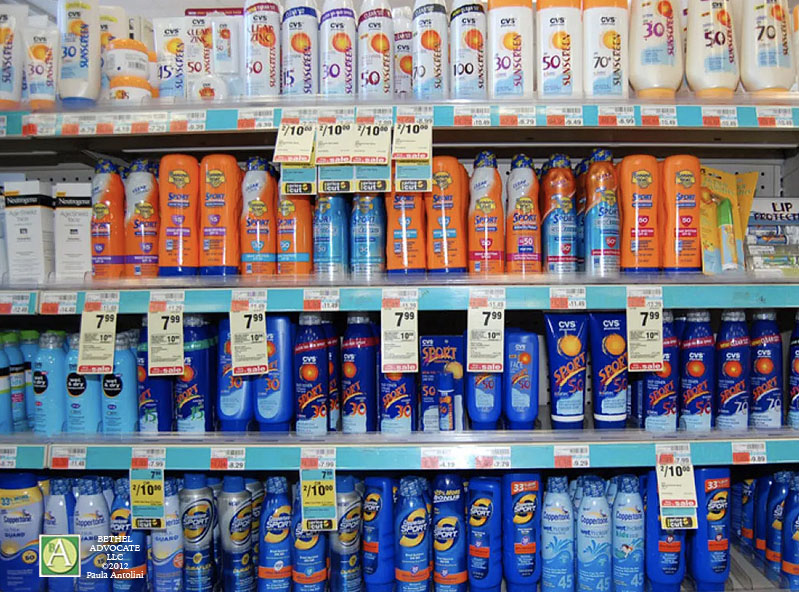
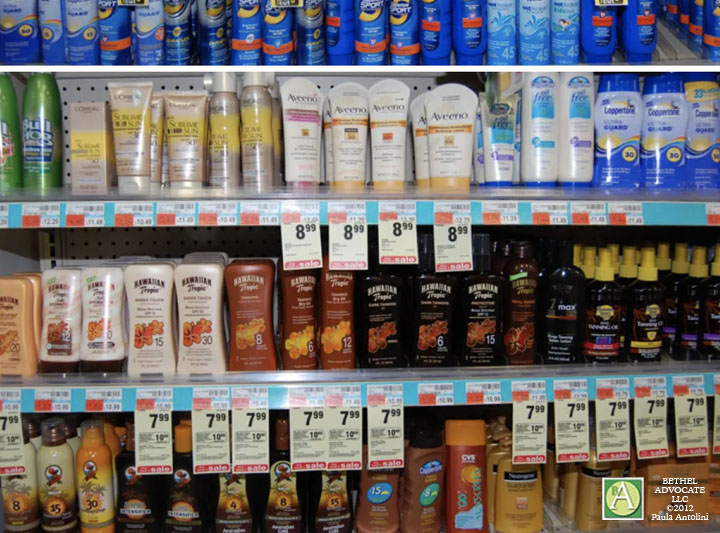

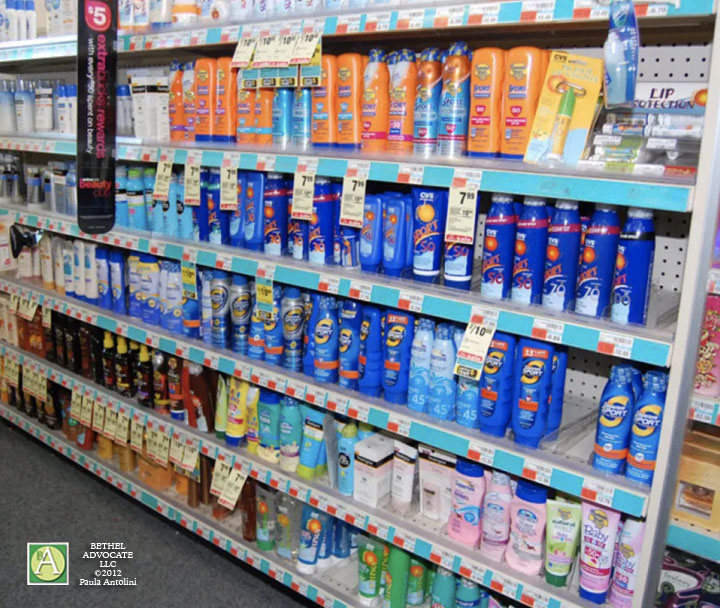
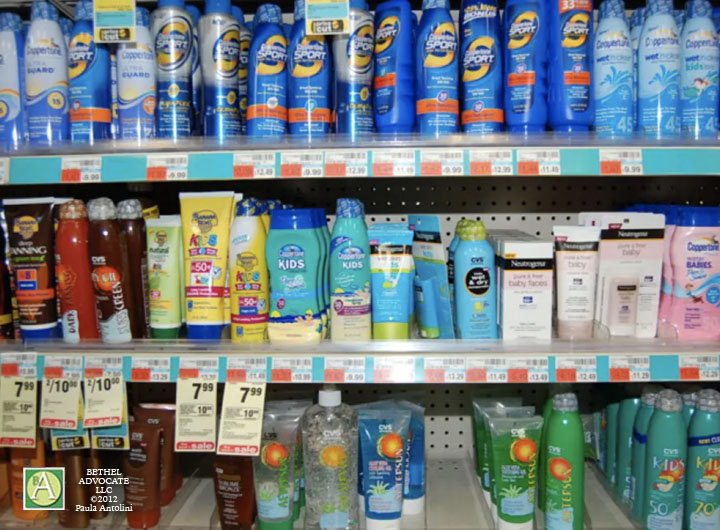
###
